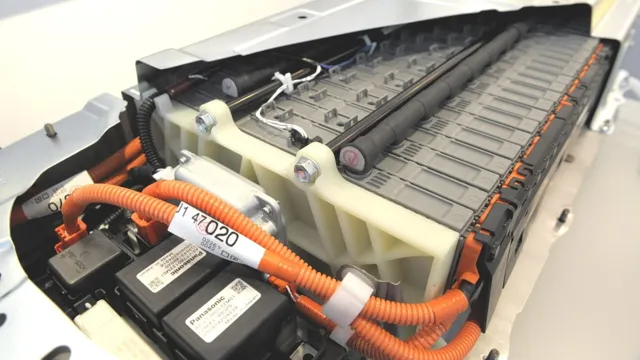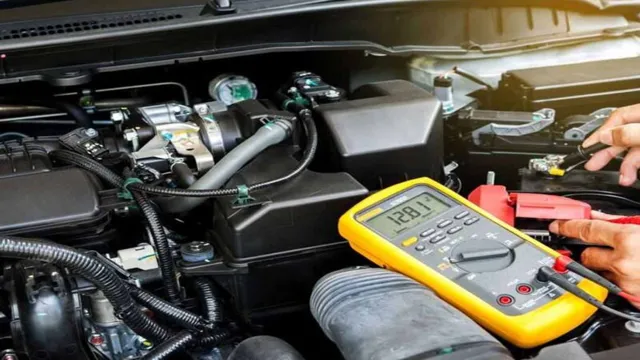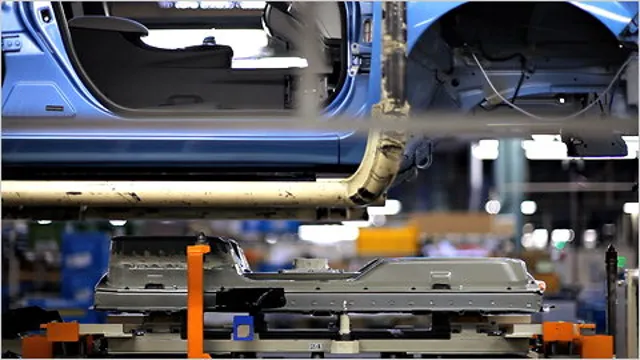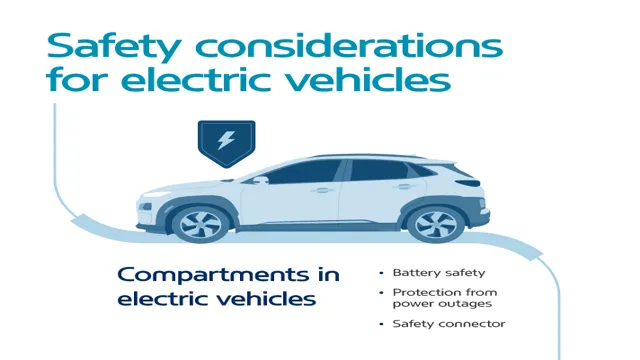Revving Up Your Ride: Everything You Need to Know about Electric Car Battery Modules
Electric car battery modules have revolutionized the way in which vehicles are powered. With the rise in global pollution and the need for energy efficiency, electric cars have become increasingly popular in today’s world. Electric car battery modules have become the powerhouse of these vehicles, providing the necessary energy required for its functioning.
These modules use rechargeable batteries, making them eco-friendly and cost-effective. The power of these modules is such that they can run for an extended period before needing a recharge. In this blog, we will discuss the many benefits of electric car battery modules and why they are the future of the automobile industry.
Electric car battery modules utilize lithium-ion batteries, which are lighter and more compact than traditional lead-acid batteries. This means that electric cars can store more power in a smaller space, resulting in more efficient use of energy. Furthermore, lithium-ion batteries are rechargeable, which reduces the need to dispose of a substantial number of batteries.
The maintenance cost of electric car battery modules is also lower than that of traditional vehicles since there is no need to change oil or replace belts. Another benefit of electric car battery modules is the fact that they produce zero emissions, making them more environment-friendly. Electric cars produce fewer greenhouse gases than traditional vehicles, resulting in cleaner air and a healthier environment for generations to come.
The power of these modules also means that they can run for significant distances before needing to recharge, which compares to around 400 to 500 km on a single charge. All in all, electric car battery modules are proving to be a game-changer in the automobile industry. They are energy efficient, cost-effective, and environmentally friendly, making a positive impact on the world.
As we move towards a greener future, electric car battery modules have become a necessary and vital component of cars. So, are you ready to go electric?
What is an Electric Car Battery Module?
An electric car battery module is the component that powers an electric vehicle. It is a self-contained unit within the larger battery pack that contains multiple battery cells, management systems and a cooling mechanism. The battery module is designed to be easily replaced if needed, and it is responsible for regulating the voltage and current of the overall battery pack.
It also ensures that the batteries remain at a safe temperature, as overheating can cause damage or even a fire. The electric car battery module plays a crucial role in the performance and functionality of an electric vehicle, and its quality and durability can greatly affect the range and power of the car. Overall, it’s one of the most important components in an electric car, providing power and longevity to help the vehicle run smoothly and efficiently.
Understanding the Basics of Electric Car Battery Modules
An electric car battery module is a central component of an electric vehicle’s power system. It is made up of several battery cells arranged together to form a single unit. These modules are responsible for storing the energy required to power the electric motor used in the car.
The modules come in different shapes and sizes and can often be replaced depending on the car’s specific make and model. While lithium-ion batteries are the most commonly used battery chemistry in electric cars, there are other types of batteries used like nickel-metal hydride batteries and lithium polymer batteries. Think of electric car battery modules as building blocks for an electric vehicle’s power source.
Each block contains several battery cells that work together to provide the electric vehicle with the energy it needs to run. Without the battery modules, an electric vehicle would not be able to move.
The Role of Battery Modules in Electric Cars
Electric Car Battery Module Electric car battery modules are the heart of an electric vehicle’s powertrain. These modules are made up of a series of lithium-ion batteries, which store the electric energy required to power the car’s electric motor. The battery modules are typically located beneath the car’s floor and provide power to the motor through a battery management system (BMS).
The BMS ensures that each battery in the module is working efficiently and prevents any damage or overheating to the system. Additionally, the battery module can be serviced to replace any damaged or worn-out batteries, ensuring the longevity of the electric car’s power source. In summary, the electric car battery module is a critical component that is responsible for providing the energy required to power the car’s motor, and it is carefully managed to ensure its safe and efficient operation.
Benefits of Electric Car Battery Modules
One of the biggest advantages of using electric car battery modules is that they can be easily replaced, making maintenance much simpler. Unlike traditional cars where the entire battery unit must be replaced, electric car battery modules offer a more modular approach. This means that if one of the modules fails, it can be easily replaced, allowing drivers to continue using their car without having to replace the entire battery unit.
Electric car battery modules also provide improved energy storage and energy management capabilities. With the help of these modules, electric cars can store more energy and power for longer periods, offering drivers greater ranges. This reduces the need for frequent recharging, making electric cars much more convenient to use.
Furthermore, electric car battery modules can be repurposed for other uses once they have reached the end of their useful life, making them more sustainable and environmentally friendly. All in all, electric car battery modules offer a range of benefits that make them a crucial component of modern electric vehicles.
Reduced Environmental Impact
When it comes to reducing your carbon footprint, an electric car battery module can provide a noteworthy benefit. By opting for an electric vehicle, you’re eliminating emissions that come with traditional gasoline-powered cars. EV battery modules are also more efficient, meaning they require less fuel and energy to run.
This leads to less pollution and a smaller environmental impact overall. Additionally, the production of electric car batteries has come a long way in recent years, with improvements in the sourcing of raw materials and the refining process. So not only are EVs better for the planet, but the manufacturing of their battery modules is becoming more sustainable as well.
All in all, choosing an electric car battery module is a great way to reduce your carbon footprint while still enjoying the benefits of modern transportation.
Improved Performance and Efficiency
Electric car battery modules offer several benefits that enhance the performance and efficiency of electric vehicles. One of the most significant advantages of these modules is their ability to provide consistent and sustained power to the electric motor, resulting in improved acceleration and higher top speeds. Electric car battery modules are also highly efficient, enabling the vehicle to travel longer distances on a single charge.
Furthermore, electric car battery modules are lightweight and compact, providing automakers with flexibility when designing and manufacturing electric vehicles. The reduced weight and compact size also contribute to a more aerodynamic design, reducing air resistance and improving the overall energy efficiency of the vehicle. In short, electric car battery modules are a crucial component of modern electric vehicles, delivering improved performance and greater efficiency, making them an excellent choice for those looking for an environmentally-friendly mode of transportation.
Lower Maintenance Costs
The electric car revolution is here, and one of its most significant benefits is lower maintenance costs. This is largely thanks to the design of electric car battery modules, which require less maintenance than traditional combustion engines. Unlike gasoline cars, electric cars have fewer moving parts that can wear out or malfunction over time, which means they are generally more reliable and last longer.
In addition, electric car batteries are designed to be more efficient and long-lasting, which reduces the need for regular maintenance or replacements. This not only saves you money on repairs but also on fuel costs, as electric cars are cheaper to power than gasoline cars. So, if you’re looking to save money on maintenance costs, investing in an electric car with efficient battery modules is the way to go!
Factors to Consider When Choosing Electric Car Battery Modules
When it comes to electric car battery modules, there are a few factors you should consider before making a purchase. Firstly, you’ll want to look for a module that has a high energy density, as this will allow you to travel further on a single charge. You should also think about the battery’s maximum power output, which will determine how quickly you can accelerate and how fast you can drive.
Additionally, you’ll want to make sure the module you choose is compatible with your car’s charging system, as some batteries may require specific chargers or adapters. Finally, it’s important to consider the overall quality and reliability of the battery module, as a high-quality battery will last longer and give you better performance over time. By taking these factors into account, you’ll be able to choose an electric car battery module that meets your needs and gives you the best driving experience possible.
Capacity and Range
When choosing electric car battery modules, there are a few factors to consider to ensure you get the best capacity and range possible. The first factor to consider is the battery’s current and voltage. A higher current and voltage mean a higher capacity, which means your car can travel further.
Another important factor is the battery’s chemistry. Lithium-ion batteries are the most commonly used and offer good capacity and range, but they can be expensive. You should also consider the battery’s temperature range and discharge rate, as this will affect the battery’s lifespan and performance.
Ultimately, the choice of battery module will depend on your driving habits and how far you need to travel. It’s important to do your research and consult with a professional to ensure you make the right decision for your electric car.
Brand and Quality
When it comes to choosing electric car battery modules, there are several factors to consider, with brand and quality being some of the most important. You want to ensure that you are investing in a reliable and reputable brand, as this can greatly impact the safety and performance of your vehicle. Additionally, quality is crucial when it comes to electric car batteries, as low-quality modules can lead to a host of issues, including decreased range and potential safety hazards.
Some key quality factors to look for include the materials used in the battery construction, the manufacturing process, and the overall design and engineering of the module. Ultimately, taking the time to research and carefully consider brand and quality can help ensure that you choose the best electric car battery modules for your specific needs and budget.
The Future of Electric Car Battery Modules
The future of electric car battery modules looks promising as companies continue to invest in research and development to improve efficiency and longevity of these modules. Some experts predict that solid-state batteries may replace the current lithium-ion ones, while others believe that lithium-ion batteries will continue to evolve and become even more powerful. Additionally, advancements in materials science and manufacturing techniques are making it possible to create thinner, lighter, and more flexible battery modules that can fit into smaller spaces and increase the range of electric vehicles.
Furthermore, as demand for electric cars grows, there is an increased focus on making the battery modules more affordable and recyclable. Electric car battery modules are paving the way for a future where vehicle emissions are significantly reduced, and we can drive around in environmentally-friendly cars.
Conclusion
In conclusion, electric car battery modules are the fuel of the future. They are the green alternative that not only helps to reduce emissions, but also saves drivers money on gas. Much like a rechargeable battery for your phone, the battery modules in electric cars can be recharged for repeated use.
With the advancement of technology, these battery modules are becoming more efficient and powerful, allowing electric cars to travel further and with more ease. So, if you’re looking to make a positive impact on the environment and your wallet, consider switching to an electric car with a state-of-the-art battery module.”
FAQs
What is an electric car battery module?
An electric car battery module is a group of individual battery cells that are combined to form a single unit that powers the electric motor of an automobile.
How does an electric car battery module work?
An electric car battery module works by storing energy in the individual battery cells that make up the module. When the car is powered on, the battery module sends the stored energy to the motor, which converts it into mechanical energy to move the car’s wheels.
Can electric car battery modules be replaced?
Yes, individual battery cells within an electric car battery module can be replaced, but it’s important to have the replacement performed by a professional to ensure proper installation and safety.
What is the lifespan of an electric car battery module?
The lifespan of an electric car battery module varies depending on several factors, including the quality of the battery cells, the frequency of use, and the care taken to maintain the battery. However, most electric car battery modules are designed to last for at least 8-10 years or more before needing to be replaced.





